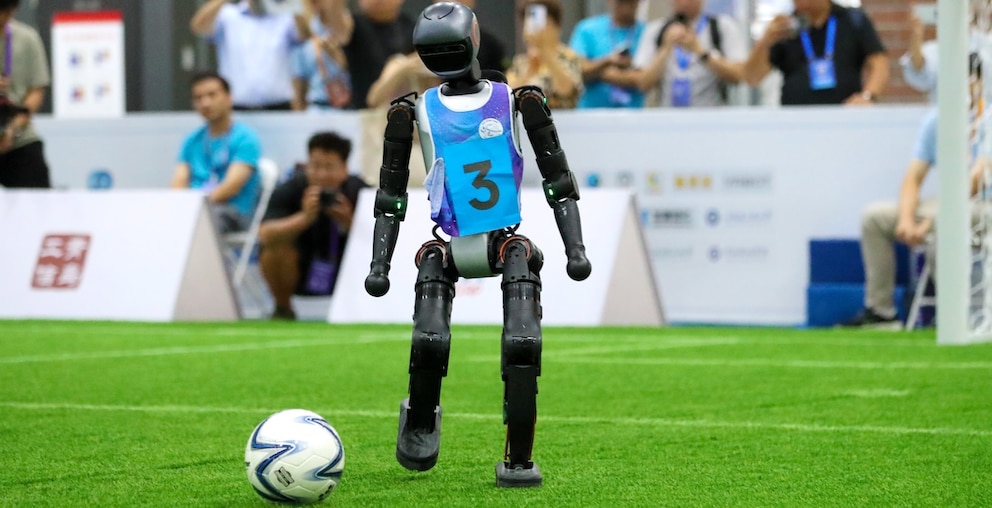Soccer fans know the feeling when their beloved team once again clumsily hands over points to the opponent. Wouldn’t it be great if the players could always perform at their best like machines? That’s still a thing of the future. However, there have been world championships for soccer-playing robots for many years. But how far are these machines from winning a game against a human team? TECHBOOK looked into teams in Bonn, Bremen, and Leipzig for this article.
First of all, the World Cup record of the three German teams at RoboCup 2025 in July is impressive. At the official robot world championship in Salvador, Brazil, all three won the World Cup title in their performance class.
B-Human from Bremen with Best Software
The RoboCup has been held annually in a different country since 1997. The league system in robot soccer requires some explanation. In each performance class, certain criteria apply or specific focuses are set. The Bremen team B-Human competed in the “Standard Platform League.” Here, all participants use the same robot model, in this case, a NAO robot from the French developer Aldebaran.
The Standard Platform League is thus comparable to Formula 1 in car racing. The hardware is the same for all participants. Therefore, the team with the best software wins in the end. The B-Human team from the University of Bremen had the best setup in the end. The kicking robots defeated RoboEireann from Ireland 3-0 in the final.
For the team around scientific supervisors Thomas Röfer and Tim Laue from the University of Bremen, this was their twelfth World Cup title in their 16th participation. The Bremen team is thus a kind of Brazil in robot soccer. However, there was a premiere, as the victory in Brazil marked their first title on the American continent.
The Bremen team cannot defend the title because the “Standard Platform League” will no longer exist at the RoboCup next year. The trend in robot soccer is also moving towards humanoid machines, meaning more human-like.
Leipzig Robots Most Human-Like
In this category, specifically in the “Humanoid League – Kid Size” class, the Boosted HTWK Robots team from the Leipzig University of Applied Sciences was able to bring the World Cup title to Germany. The Leipzig robots defeated the TH-MOS team from China decisively with 11-0 in the final. In the humanoid performance class, the participating teams have the greatest ambition to build a robot team capable of winning an official human soccer World Cup by 2050. Anyone who has watched the final video will realize that the machines still have a long way to go.
Nevertheless, humanoid robots now possess enormous capabilities, such as dynamic walking, running, and kicking the ball while maintaining balance, recognizing the ball, other players, and the field, determining their own playing position on the field, and interacting with team members. This performance is thanks to the Leipzig robot team’s scientific advisory staff, which now includes 20 members.
German Work Robots Leading the Way
In a completely different league, the b-it-bots team from the Bonn-Rhein-Sieg University of Applied Sciences in Sankt Augustin operates. This German robot team won the World Cup title in the work robot league. This competition can best be compared to the decathlon in athletics.
To win, the robots must complete various tasks. This includes navigating a predetermined course as quickly as possible. Along the way, they must recognize, grasp, and transport various objects. The Bonn robot did this best.
In the end, it came down to a neck-and-neck race between two German machines. Before the final stage, the SWOT team from the University of Applied Sciences Würzburg-Schweinfurt was slightly ahead of the Bonn team b-it-bots. But in the last run, the robot from Bonn delivered an almost flawless performance. In the end, b-it-bots won with 9,551 points, a record score, as no work robot has ever achieved such a high score at the RoboCup.
Incidentally, the second and third places were also secured by German robots, with the aforementioned SWOT team from Schweinfurt becoming the runner-up. The bronze went to the autonOhm team from the Nuremberg University of Applied Sciences.
At least in the realm of robots, German teams have been shining at world championships for many years. Whether there will ultimately be a human vs. machine duel at a soccer World Cup in 2050 remains to be seen.
The post Will Robots Soon Play Soccer Better Than Humans? appeared first on TECHBOOK.

